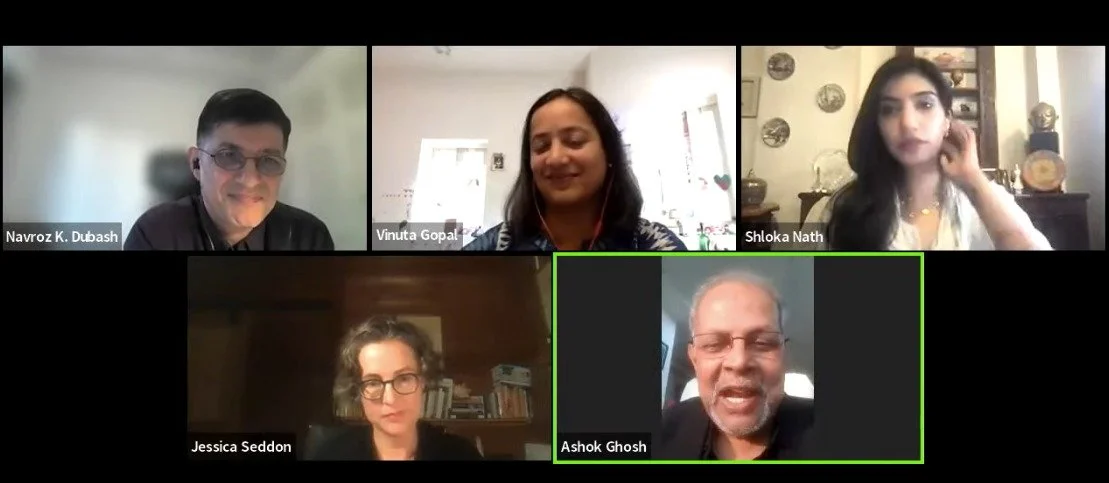Thinking strategically about air quality management in India: Highlights from CPR's webinars
It’s winter in Delhi, and as the city is blanketed by a brown soup of air pollution again, a familiar storyline is playing out. This year, too, focus on the issue picked up just in time for Diwali, reaching a crescendo during the stubble-burning season. Arguments rage on which source contributes how much to the ever-worsening air quality. Questions are raised about whether air pollution could be harmful, even cause death, with the Union government responding that there is too little evidence on the health impacts of air pollution.
This story plays out year after year because our attention is focused on this environmental and health emergency for far too short a period – and when it is, we miss the wood for the trees, Dr. Bhargav Krishna and Shibani Ghosh explain in an article published in the Hindustan Times in December 2021.
India's nationwide, year-round air quality crisis requires a radical rethink. But how does parliamentary discourse frame this issue? How should India approach its air quality standards in light of the WHO making its global guidelines more stringent? What would "taking the long view" on air pollution strategy look like?
To explore these questions, the Centre for Policy Research hosted three webinars on air pollution with a host of different representatives from India's air quality governance ecosystem. We share some highlights from these discussions below.
Unpacking Political Narratives on Air Pollution in India (November 29, 2021)
Informed by CPR's new working paper, Members of Parliament (MPs) Dr. Heena Gavit and Gaurav Gogoi discussed strengthening political narratives on air pollution and the path forward with Yamini Aiyar. Watch the video here.
"The 15th Finance Commission has given funds to states and urban local bodies to address air pollution. But more awareness and capacity-building is needed to ensure that ULBs prioritise it. We need to bridge the gap between the centre and state when talking about air pollution."
– Dr. Heena Gavit, MP, Lok Sabha (Maharashtra), Bharatiya Janata Party (BJP)
"It's important to take air pollution from an episodic, winter-centric issue to a nationwide health issue."
– Gaurav Gogoi, MP, Lok Sabha, (Assam), Indian National Congress (INC)
Airing Differences? Reading the Political Narrative on Air Quality Management in India
By SANTOSH HARISH, MANDAKINI CHANDRA, and SAHITHI UPPALAPATI
Read CPR’s research paper here.
Strengthening India's Air Quality Standards (December 7, 2021)
Dr. Mukesh Sharma, Dr. Poornima Prabhakaran, and Dr. Ajay Shah talked about creating an effective consultative process to review India's National Ambient Air Quality Standards (NAAQS), building on analysis from CPR's new framing note. Watch the video here.
"Bringing health evidence into standard-setting and policymaking is important – and not just once in a decade."
– Dr. Poornima Prabhakaran, Head - Environmental Health, and Deputy Director, Centre for Environmental Health, Public Health Foundation of India
"The four principles that are relevant to this process are: to center health in air quality policymaking; to base all policy decisions on a solid foundation of science; to ensure the relevance of these standards by committing to pre-defined and periodic reviews; and to build trust with civil society and other stakeholders."
–Dr. Bhargav Krishna, Fellow, Centre for Policy Research
Strengthening India’s Ambient Air Quality Standard-Setting Process
Read CPR’s framing note here.
Reforming Air Quality Governance in India (December 15, 2021)
Co-hosted with the India Climate Collaborative, this webinar explored the roles of some key actors in the air quality governance ecosystem– regulators, researchers, advocacy groups, funders – in strategically implementing reforms. Watch the video here.
"The first problem is that the action plan is not confined to one department. There are many partners: the road construction department, urban local bodies, and so on. When there are questions about increasing air pollution, people face us. But they don't understand that everything is not done by us– it must be coordinated differently. [...] The second problem is that of limited manpower to implement this action plan."
–Dr. Ashok Ghosh, Chairperson, Bihar Pollution Control Board
"Strengthening air quality governance will require us to develop ideas and initiatives to resolve sectoral roadblocks, such as entrenched incentives for unsustainable paddy cultivation and opacity in industrial emissions monitoring."
– Santosh Harish, Fellow, Centre for Policy Research
Renewing India’s Air Quality Management Strategy in the Shadow of COVID-19
Read CPR’s report here.
Interested in learning more about CPR’s work on air quality management in India? Read more:













ETS is gaining traction as a market-based instrument to reduce industrial emissions. However, questions around transparency, reproducibility, state capacity, and policy design and clarity threaten the viability of this approach in the Indian context.